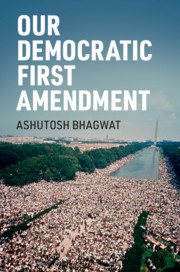'By highlighting the First Amendment’s too often neglected press, assembly, and petition clauses, Bhagwat shows how the democratic free speech tradition most closely associated with Louis Brandeis complements rather than contradicts the broadly libertarian understanding that finally emerged following the McCarthy era. Eschewing censorship, Bhagwat would turn to what Tocqueville identified as America’s distinctive democratic strength - civil society institutions - to tackle our age’s pathologies of information silos, Internet trolls, and fake news. Our Democratic First Amendment is at once clear-eyed and boldly free of cynicism.'
Michael C. Dorf - Robert S. Stevens Professor of Law, Cornell University
'Ash Bhagwat offers an original and powerful analysis of the core purposes of the First Amendment and of how those purposes should play out today. In particular, he notes that almost all of the Supreme Court's attention has focused on the freedom of speech, and that the Court has essentially written out of the First Amendment the freedom of the press, the right of assembly, the right of association, and the right to petition the government. It is only, he argues, by considering all of these rights in their relation to one another that the Court can come to a proper understanding of 'Our Democratic First Amendment'. Bhagwat then turns to the challenges of the present, including social media, the collapse of 'mainstream media', and the 'siloing' of American society. In the end, he offers suggestions for how, in the current state of affairs, we can still save our democracy.'
Geoffrey R. Stone - Edward H. Levi Distinguished Service Professor of Law, University of Chicago
'Bhagwat’s eminently readable prose drives home the importance of speech, press, assembly, and petition to our current and future democratic experiment. Readers will benefit from this book’s careful consideration of these rights individually and collectively, and how our use of them protects and performs sovereignty, citizenship, and democracy.'
John Inazu - Sally D. Danforth Distinguished Professor of Law & Religion, Washington University, St. Louis
'The First Amendment lists four specific freedoms of expression: speech, press, assembly (association), and petition, but the courts have tended to merge them all into one. This engaging book discusses each of these freedoms on its own terms, and explains for a general audience why they all matter now, more than ever. Whether you are liberal or conservative, this book will help you understand your rights as an American.'
Michael W. McConnell - Richard and Frances Mallery Professor and Director of the Constitutional Law Center, Stanford University
‘This title is well sourced, remarkably engaging, and for students and scholars alike.’
D. E. Smith
Source: Choice
‘… an exceptional review of the First Amendment’s principles and their interdependent purposes. These passages provide great value for theorists, scholars, and practitioners - and especially for students of American politics, constitutional law and history, and the Bill of Rights.’
Andy Carr
Source: Law and Politics Book Review



